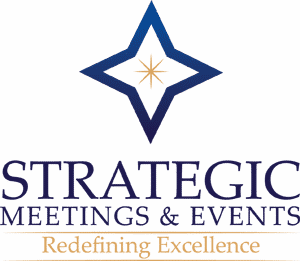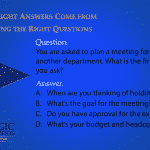The Right Answers Come from Asking the Right Questions
By Christy Lamagna, CMP, CMM, CTSM
 While there is no magic wand that will transform your work world overnight, if you start thinking strategically, many of the challenges you currently face will significantly decrease if not disappear altogether. If you wonder if your particular situation fits into my theory, take the quiz below and find out for yourself.
While there is no magic wand that will transform your work world overnight, if you start thinking strategically, many of the challenges you currently face will significantly decrease if not disappear altogether. If you wonder if your particular situation fits into my theory, take the quiz below and find out for yourself.
The phrase that best describes my work day is:
A. Hang on and hope for the best
B. It’s pointless to question the decisions I’m being asked to follow. Nothing changes
C. Even if I had a clone I’d be a week behind in my work
D. If I just keep moving I will avoid realizing how exhausted I am
E. All of the above
You return from a grueling program and hear:
A. You’re so lucky, you get to travel!
B. Nice of you to come back. I don’t get to go anywhere
C. Did you have any of those giveaways left? I’d like one
D. It must be fun to plan parties for a living
E. All of the above
You ask for more help as your workload is crushing. The reply is:
A. You can use Tom from the mailroom. He has a few hours free
B. This is the same amount of work you’ve always done, what’s the problem?
C. My daughter wants to plan events for a living. I’ll have her intern for you
D. You stopped asking a long time ago.
E. All of the above
The above questions, while tongue in cheek, may resonate with you on some level. If that’s the case, it’s a sign that you are planning logistically not strategically. The good news is we can change that. First let’s decode the questions and identify some of the core problems we face as an industry:
Question one speaks to the frenetic speed of our workdays. This pace is a result of reacting to situations rather than being an integral part of a strategic decision-making process, thereby reducing fire drills and pop up issues that knock your day off course.
Question two speaks to the misperception of what we do. How often have you heard an iteration of the sample responses above? The challenge is that all too often, when people misconstrue what we do for a living we don’t take the opportunity to educate them and set the record straight. For as long as our friends, colleagues, bosses and the public think of us in the terms described above without being corrected, the misconception thrives.
Question three speaks to the perceived value of meetings and the work required to plan them. Until you can clearly articulate the value of meetings to your executives, and demonstrate their worth to the organization’s bottom line, your staffing budget as well as your events budgets are likely to be underfunded.




